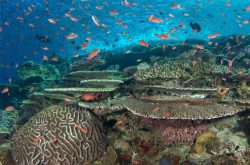
A new study released July 1 in Nature Climate Change gives hope for coral reefs.
Launched by the nonprofit Coral Reef Alliance, with lead and senior authors at the University of Washington, the study is one of the first to demonstrate that management that takes evolution and adaptation into account can help rescue coral reefs from the effects of climate change.
Importantly, the results show that by making smart decisions to protect reefs today, conservation managers can generate the conditions that can help corals adapt to rising temperatures.
Key to successful evolution is management that improves local conditions for reefs by effectively reducing local stressors, such as overfishing and water pollution. However, the authors caution that not all management strategies are created equal.
“We used mathematical models to test the effects of management choices on coral reef outlooks,” said lead author Tim Walsworth, a postdoctoral researcher at the UW School of Aquatic and Fishery Sciences. “We found that corals in well-managed areas act as a source of baby corals in the future, essentially rescuing reefs after the climate stabilizes. Without both evolution and management, the corals in our model were unable to survive rising temperatures.”
Read more at UW News »
